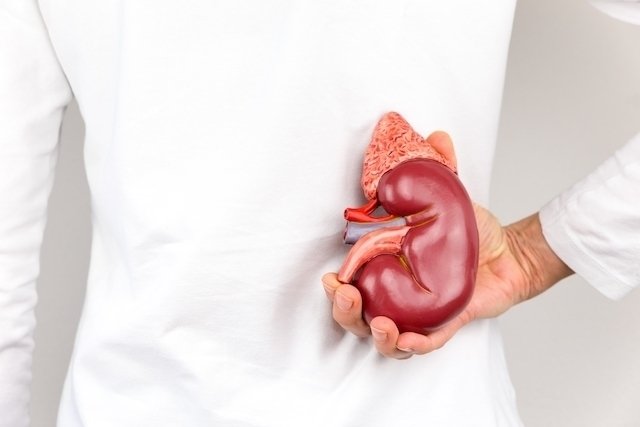Chronic kidney problems generally do not cause symptoms in the initial phase, however, as the disease progresses, symptoms such as reddish or frothy urine, frequent urge to urinate, back pain and swelling of the body may appear, but sometimes itching may also appear in the skin, changes in sleep and even taste.
However, in some cases, changes in the kidneys do not cause any signs or symptoms. It is important for people who have risk factors, such as high blood pressure, diabetes, autoimmune diseases or obesity, for example, to regularly undergo tests to check the loss of protein in the urine and the level of creatinine in the blood, to identify possible changes.
Check out some symptoms of kidney problems in the video below:
11 symptoms of kidney problems
Some symptoms that may indicate kidney problems are:
1. Frequent urge to urinate
The frequent urge to urinate can sometimes indicate kidney infection, it tends to appear especially when the bladder is also affected by the infection. Another cause is problems affecting the prostate.
2. Urinate in small quantities
Urinating in small amounts may be a sign of an obstructed urinary tract or that the kidneys are not filtering the blood properly to form urine. Furthermore, it is also a common symptom in cases of urinary tract infections and dehydration.
3. Back pain
Back pain caused by kidney problems is mainly noticed in the lower part, especially the sides of the torso. Furthermore, pain can also affect the groin and prevent a person from carrying out their daily tasks.
4. Swelling in the body
When the kidneys cannot filter the blood properly and too many proteins pass from the blood into the urine, swelling can occur, which when it affects the entire body is called anasarca. The accumulation of fluid not excreted by the kidney is another cause of anasarca. Know the causes of anasarca.
5. Itchy skin
Itchy skin can be a symptom of kidney problems, especially in the case of chronic kidney disease, and usually occurs due to the accumulation of toxins in the blood caused by decreased kidney function.
6. Excessive tiredness
Excessive tiredness can sometimes be caused by kidney problems, especially in more serious cases of chronic kidney disease, where anemia is common and pro-inflammatory substances are released.
7. Change in urine color
Reddish or whitish urine, for example, can be indicative of a kidney infection, called pyelonephritis. It can also be caused by inflammation in the glomeruli, in autoimmune diseases, for example, called glomerulonephritis. Understand better what pyelonephritis is.
8. Foamy urine
Foamy urine may indicate that the kidneys are not working properly, allowing too many proteins to pass from the blood into the urine, which is called proteinuria, causing the urine to appear foamy. Check out what proteinuria could be.
9. Difficulty sleeping
Difficulty sleeping tends to arise when the functioning of the kidneys is severely impaired and the accumulation of toxins in the body begins to affect the brain, which can cause mental confusion, disorientation and agitation, impairing sleep.
10. Loss of appetite
Loss of appetite is common in cases of chronic kidney disease in advanced stages and kidney infections, and may be associated with other symptoms such as nausea and vomiting, resulting from the accumulation of toxic substances and pro-inflammatory molecules.
11. Change in taste
Especially when the functioning of the kidneys is severely impaired, changes in taste may also occur, such as the sensation of a metallic taste in the mouth, which is called dysgeusia. Understand better what dysgeusia is.
Online symptom test
If you think you may have a kidney problem, select the signs and symptoms you are experiencing to find out your risk:
However, to confirm whether there is a kidney problem, it is important to consult a nephrologist or general practitioner for an evaluation, so that the cause of the symptoms can be identified and the most appropriate treatment can be initiated.
Most common kidney problems
The problems that most frequently affect the kidneys are:
- Kidney stone: consists of the accumulation of small stones inside the kidney, which can make it difficult for urine to pass to the bladder;
- Autoimmune diseases: can affect the glomeruli, which are the main part of the kidney’s filtration structure;
- Polycystic kidney disease: leads to the appearance of several cysts in the kidney that can make it difficult to function;
- Hydronephrosis: appears when urine cannot pass to the bladder due to obstruction of the urinary tract, accumulating inside the kidney;
- Chronic kidney disease: arises due to progressive damage to the kidneys that prevents their functioning;
- Kidney infections: are caused by bacteria that reach the kidney through the urinary tract;
- Acute kidney injury: it manifests mainly in people who are admitted to the ICU, people with a history of kidney problems or elderly people, for example, whose kidneys temporarily reduce their functioning, reversibly, requiring urgent treatment;
- Neoplasms: They can appear in any part of the urinary tract, especially the kidneys and bladder.
Furthermore, people with illnesses such as high blood pressure and uncontrolled diabetes have a higher risk of developing chronic kidney disease, and it is important that they undergo treatment according to their doctor’s instructions. See more causes of chronic kidney disease.
Tests that evaluate the kidneys
The tests that can be used to identify the problem that is affecting the kidneys are:
- Bloodtests: to assess the levels of substances that are normally eliminated by the kidney, such as creatinine and urea;
- Urine tests: the presence of proteins or blood in the urine are changes that may indicate kidney problems;
- Ultrasound or tomography: help identify changes in the kidneys, such as cysts and tumors;
- Biopsy: It is sometimes indicated to identify the cause of abnormal kidney function, for example.
These tests can be recommended by a nephrologist or general practitioner, so whenever there is a suspicion of kidney problems it is important to go to the doctor to confirm if there is any change.
Taking care of your health has never been easier!
How to treat kidney problems
The treatment of kidney problems depends on their cause and, in milder cases, such as the presence of small kidney stones or cysts, symptoms can be alleviated with simple changes to the diet, such as drinking more water, avoiding salt consumption and increasing calcium intake, for example. Check out what to eat in case of kidney stones.
In more serious cases, such as terminal chronic kidney disease or mild to moderate chronic kidney disease, treatment must always be guided by a nephrologist, as it may be necessary to control the amount of water ingested, take specific medications, undergo dialysis, transplant and even undergo surgery to treat kidney injuries.
In the case of cancer, surgery is generally recommended to remove the tumor or the entire kidney, if it is a serious situation, and chemotherapy or radiotherapy may also be necessary to eliminate the remaining cancer cells.
Furthermore, it is important to treat other diseases, such as diabetes, obesity or high blood pressure, following the doctor’s instructions, to avoid further damage to the kidney.

Sign up for our newsletter and stay up to date with exclusive news
that can transform your routine!
Warning: Undefined array key "title" in /home/storelat/public_html/wp-content/plugins/link-whisper-premium/templates/frontend/related-posts.php on line 12
Warning: Undefined array key "title_tag" in /home/storelat/public_html/wp-content/plugins/link-whisper-premium/templates/frontend/related-posts.php on line 13




